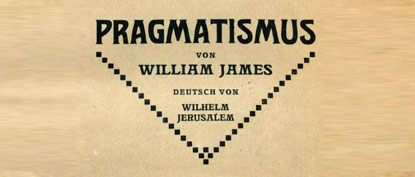“Pragmatism” can be understood in different ways: more narrowly as a specific school of philosophy, or more broadly, as a perspective on science and human life. C.S. Peirce and W. James understood pragmatism primarily as a distinctive ‘method’ for dealing with philosophical questions. Other proponents of pragmatism found it more important to emphasise its pluralism: in this vein, A.O. Lovejoy distinguished thirteen and F.C.S. Schiller seven forms of pragmatism respectively. When taken in this pluralist way, pragmatists were united – primarily or merely – by a common concern for practice and action; for taking seriously the results of modern science (especially Darwinism); or for negotiating the divide between relativism and absolutism.
According to the dominant narrative, pragmatism originated in the U.S. from where it spread to Europe and influenced a wide range of different authors. While there is some truth in this story, it fails to mention that pragmatist themes developed in Europe also independently from the philosophies of Peirce, James up to Dewey. In the philosophy of science, for example, there was a convergence of European Logical Empiricism (e.g., R. Carnap, O. Neurath, M. Schlick, H. Reichenbach) and American Neo-pragmatism (e.g., Ch. Morris, C.I. Lewis, W.V.O. Quine).
The purpose of the conference is to identify and reassess different forms of “European pragmatism”, and how they interacted with American pragmatism. Natural starting points are Ernst Mach, Wilhelm Jerusalem, or Tadeusz Kotarbinski. The distinctive character of various national European traditions (esp. in Central Europe, UK, Nordic Countries, France, Italy and Poland) will be highlighted. A special session will be devoted to Frank P. Ramsey.
The Conference is organized together with
Institute of Philosophy
Institute Vienna Circle
ERC project 339382 “The Emergence of Relativism”
FWF Hertha-Firnberg-Programme “Ramsey’s Probability Theory of Truth” ( T 725 Firnberg-Programme)
Vienna Circle Society
